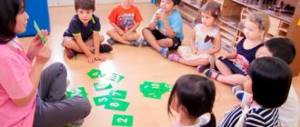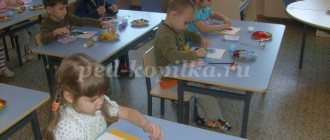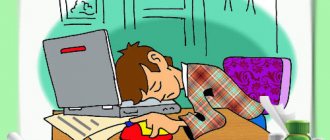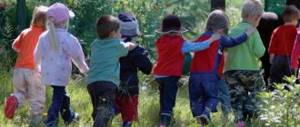Teacher professional self-education program
NATALIA KHOVANSKOVA
Teacher professional self-education program
Relevance.
The transformations taking place in all spheres of our society will require an active, proactive person with a high potential for self-development, a subject of professional and personal life. To educate such a person means to help him become a subject of culture, the historical process, and his own life.
Since a person’s subjective properties are established in early childhood, this places new demands on the results of working with children in kindergarten.
The quality of preschool education is determined by many factors, one of which is the continuous improvement of the level of theoretical training and professional skills of teachers. An important role in this regard is played by the systematic, independent familiarization of educators and other preschool educational institutions specialists with the latest achievements of pedagogy, with the best practices of other educational institutions, as well as the study of program and methodological materials and regulatory documents.
A modern kindergarten teacher is at the same time a teacher, an educator, an organizer of children’s activities, an active participant in communication with preschoolers, their parents and colleagues, a researcher of the pedagogical process, a consultant, an educator and a social activist. He constantly improves the level of his professionalism and teaching skills, and conducts a creative search for new things.
The changes taking place in the modern education system make it urgent to improve the qualifications and professionalism of the teacher, that is, his professional competence. A free-thinking teacher who predicts the results of his activities and models the educational process is a guarantor of achieving the goals of modern education.
A professionally competent teacher is one who carries out pedagogical activities, pedagogical communication at a sufficiently high level, and achieves consistently high results in teaching and raising children. The development of professional competence is a dynamic process of assimilation and modernization of professional experience, leading to the development of individual professional qualities, the accumulation of professional experience, implying continuous self-education, self-development and self-improvement of the teacher.
Self-education helps to adapt to a changing social and political environment and fit into the context of what is happening; it expands and deepens the knowledge acquired in courses, and contributes to understanding experience at a theoretical level.
Program idea:
Creating conditions for personal pedagogical growth and successful socio-psychological adaptation of children. Formation in preschoolers of the ability to understand and accept the world around them, to emotionally and positively express their attitude towards it. Develop productive communication abilities.
Target:
Increasing your theoretical, methodological, professional skills and competence as a teacher.
Tasks:
1) develop the creative potential of students and create the necessary conditions for intensifying cognitive research activities and developing logical thinking.
2) develop skills of independent activity;
3) increase children’s self-esteem and self-confidence;
4) develop creativity, curiosity, observation;
5) improve the quality of education through the introduction of new information technologies;
6) generalize and disseminate your own experience.
Expected results:
1) Mastery of alternative forms and methods of conducting educational activities, including information and communication technologies for the full and effective implementation of the methodological theme “Development of logical thinking of children through play activities”;
2) improving the quality of the educational process;
3) development and conduct of open classes on innovative technologies.
b]Topic: “Development of children’s speech through oral folk art”
№
p\p Action plan Approximate implementation period Completion mark
Advanced training and professional retraining
1. Independent study of regulatory documentation in the field of preschool education and education in general.
Theoretical study of the topic. Magazines and newspapers: “Preschool education,” etc.
systematically
2. Advanced training courses
2017
3. Certification for the first qualification category
2019
4. Study of innovative methods of work of district educators in the field of education and training.
systematically
Use of modern educational technologies
1. Study of articles, brochures of innovative teachers
systematically
2. Making presentations about the work “Development of children’s speech through oral folk art.”
systematically
3. Use of non-traditional techniques and methods of work at OOD and in daily activities.
systematically
4. Acquisition of new methodological literature.
systematically
5. Drawing up your own author’s development of activities with game elements for speech development in preschoolers
2017– 2019
6. Development of own didactic materials and their use in the process of educational and educational work.
2017 – 2019
7. Conducting pedagogical diagnostics (assessing the individual development of children, questionnaires, tests, pedagogical observations in order to increase the level of mastery of the “Basic educational program of preschool education MBDOU/s “Firefly”
2017– 2019
8. Implementation of the results obtained in teaching practice.
2017 – 2019
Generalization and dissemination of one’s own teaching experience
1. Speaking to colleagues at teacher councils, holding open classes
According to the plan of the camp "Firefly"
2. Publications in the media. systematically
Working with family
1. Development of a plan for cooperation with parents in order to enhance interaction between the kindergarten and the family on issues of education and development of children
2017– 2019
2. Design of folders, consultations, holding holidays, leisure activities, etc. “Development of children’s speech through oral folk art”
2017 – 2019
Working with preschoolers in educational activities and in everyday life
1. Continue to create conditions for the comprehensive development of children in the group;
Creation of a subject-development environment;
Creating conditions for the development of role-playing, didactic, theatrical games;
Maintaining a favorable emotional and positive environment in the group (individual approach to each child)
2017– 2019
2. To achieve active and effective participation of preschoolers and their parents in activities.
2017 – 2019



